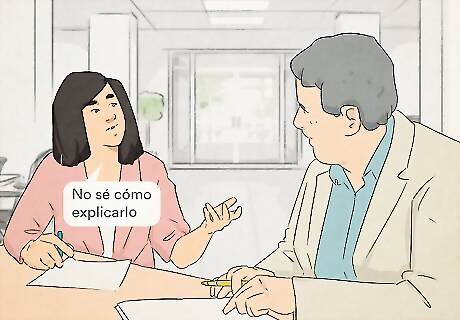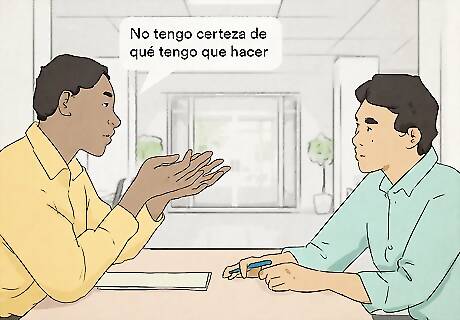
views
No sé (noh say)

"I don't know." This is the most common, most basic way to say "I don't know" in Spanish. It's appropriate in any situation, regardless of who you're talking to. If you only learn one way to say "I don't know," it should be this one. No sé montar en bicicleta. (I don't know how to ride a bicycle.) No sé cómo explicarlo. (I don't know how to explain it.) No lo sé con certeza. (I don't know for sure.)
No tengo idea (noh TEHN-goh ee-DAY-ah)

"I don't have any idea." This is a more casual phrase, one you would use more often with friends or in casual conversation. If you're talking to someone in a position of authority, it can sound like you're being dismissive. No tengo idea de que estás hablando. (I have no idea what you're talking about.) No tengo idea de lo que estás diciendo. (I have no idea what you're saying.) No tendo idea de qué pasó. (I have no idea what happened.)
Ni idea (nee ee-DAY-ah)

"No idea." This is a quicker, simpler way to say, "no tengo idea." It's typically used to respond to a question or something someone else has already said. In more formal circumstances, it might come across as too abrupt or dismissive, but it's perfectly acceptable in virtually any context. Mind your tone, just as you would in English, so the intent behind your words isn't misunderstood. ¿Sabes cómo arreglar esto? —Ni idea. (Do you know how to fix this? —No idea.) ¿Cuánto costará un boleto a México? —Ni idea, pregúntale a Billy. (How much would a ticket to Mexico cost? —No idea, ask Billy.)
No tengo certeza (noh TEHN-goh SEHR-tay-zah)

"I don't have certainty." This phrase is similar to "no tengo idea," but it's a little more formal. Use it in a work context or if you're talking to someone in a position of authority. It tells them that you have doubts about a fact or statement. This little phrase also comes in handy if you're not 100% sure about something and don't want to look like you're lying. No tengo certeza de sus motivos. (I'm not certain of their motives.) No tengo certeza de cuando va a volver. (I'm not certain when she'll be back.) No tengo certeza de qué tengo que hacer. (I'm not certain what I have to do.)
No te comprendo (noh tay kohm-PREHN-doh)

"I don't understand you." You can also simply say, "No comprendo," which means "I don't understand." This phrase is suitable for any context or degree of formality. You'd usually use it if you didn't understand the reasoning or logic behind whatever was said, but you could also use it if you simply didn't understand the person because you are a beginning Spanish learner. Sí, no te comprendo para nada. (Yes, I don't understand you at all.) No te comprendo, habla más despacio por favor. (I don't understand you, speak more slowly please.) Dijiste muchas cosas, no te comprendo. (You said many things, I can't understand you.)
No entiendo (noh ehn-TEE-ehn-doh)

"I don't understand." This phrase is used more commonly than "no comprendo" by native Spanish speakers. While the two verbs "entender" and "comprender" are basically synonyms and can be used interchangeably, "entender" usually indicates a general level of understanding. You might also think about these two verbs in terms of the difference between the English verbs "understand" and "comprehend." Perdon, no te entiendo. (I'm sorry, I don't understand you.) No entiendo nada de lo que dices. (I don't understand anything you're saying.) No entiendo la pregunta. (I don't understand the question.)
No conozco (noh koh-NOHTS-koh)

"I don't know." While "no conozco" means the same thing as "no sé," these verbs are used differently. The verb "conocer" specifically applies to people or places. Use this if someone asks you if you know someone else, or if a name is brought up in conversation and you want to indicate that you don't know who that person is. ¿María? No lo conozco. (María? I don't know her.) No conozco Madrid. (I don't know Madrid/I'm not familiar with Madrid.)
No estoy seguro (noh EHS-toy SAY-goo-roh)

"I'm not sure." Here's another phrase to use if you think whatever you're saying is true, but you can't be 100% about it. You can also use this to respond to a question if you don't want to say "no" outright to someone, or if you need a little more time to think before giving them a definite answer. No estoy seguro de poder ir. (I'm not sure if I'll be able to go.) No estoy seguro de lo que dices. (I'm not sure about what you're saying.) Aun no estoy seguro de qué es. (I'm not sure yet exactly what it is.)
No me queda claro (noh may kay-dah KLAHR-oh)

"It's not clear to me." This phrase works well if you've picked up the basics of something someone's been telling you, but you don't quite understand it fully. It lets them know that there are still some details you're fuzzy on or maybe a few words you don't quite understand. This is a rather polite phrase that's suitable for all contexts. No me queda claro en quien confiar. (It's not clear to me who can be trusted.) No me queda claro lo que dices. (It's not clear to me what you're saying.) No me queda claro qué pasó. (It's not clear to me what happened.)
Sigo sin entender (SEE-goh seen EHN-tehn-dehr)

"I still can't understand." Use this phrase if someone has tried to explain something to you several times and you still don't get it. It helps them understand that you're still confused and acknowledges the effort they've already put in to help you. Sigo sin entender de qué hablas. (I still don't understand what you're talking about.) Sigo sin entender la historia. (I still don't understand the story.) Y sigo sin entender por qué. (And I still don't understand why.)




















Comments
0 comment